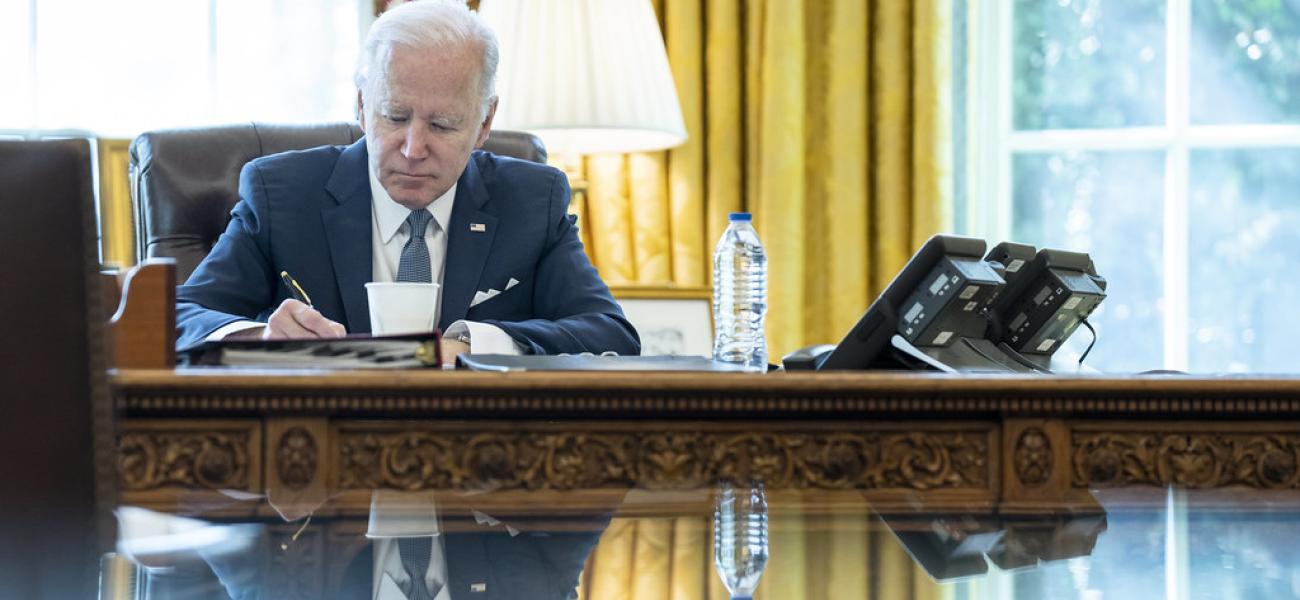
The Ukraine Temptation
April 12, 2022
Stephen Wertheim
This is a summary of an article originally published by Foreign Affairs, with the subheading: "Biden Should Resist Calls to Fight a New Cold War."
The author, senior fellow in the American Statecraft Program at the Carnegie Endowment for International Peace and visiting faculty fellow at the Center for Global Legal Challenges at Yale Law School, writes:
- "For three decades, U.S. foreign policy has run on inertia and called it strategy. ... When problems appeared, successive administrations generally took them as reasons to expand U.S. deployments. Even if its bid for primacy had created or exacerbated those problems, Washington had the solution: more and better primacy."
- "Now the war in Ukraine is tempting policymakers to repeat that mistake in an exceedingly consequential way. Rather than pivot to Asia, advocates of U.S. primacy argue, the United States must now build up its military presence in Europe to contain an assertive Russia, even as it strengthens its Indo-Pacific defenses to contain a rising China."
- "The Biden administration should decline this invitation to wage a risky global cold war. Although the invasion of Ukraine has revealed Russian President Vladimir Putin’s willingness to take risks in the pursuit of aggression, it has also exposed the weakness of the Russian military and economy."
- "The war in Ukraine has made strategic discipline not only more necessary but also more achievable. … Biden should reject a cold war strategy of dividing the world and keeping one half dependent on the United States. …The first step is to support Ukraine while avoiding escalation into a direct clash between U.S. and Russian forces. … A negotiated agreement will almost certainly require lifting at least some of the harshest sanctions on Russia, including the freeze of the Russian central bank’s assets."
- "Biden should take advantage of a once-in-a-generation opportunity to put the European security order on the path to self-sufficiency. With immense economic and demographic superiority, Europe is more than capable of developing the military power to balance Russia. … Biden should back European strategic autonomy and make a six-year plan, to cover the rest of his term and the next one, to transition European defense to European leadership."
- "Limiting the United States’ burdens in Europe would enhance its strategy in Asia."
- "Military restraint is desirable on strategic grounds, but it is also essential to freeing U.S. statecraft to pursue what matters most. The priorities that Biden identified when he came into office—delivering prosperity for ordinary Americans and tackling climate change and pandemics—remain just as important today, and the war has made them even harder to address."
- "A new cold war promises clarity of purpose. In reality, it would impose enormous costs and generate unnecessary risks. It would not, moreover, make other priorities go away; it would more likely exacerbate the United States’ domestic travails and stifle urgent international cooperation. After 9/11, the United States allowed itself to become consumed by fears of the enemy. After Ukraine, the Biden administration should let nothing keep it from advancing the best interests of Americans."
Read the full article at Foreign Affairs.
Author
Stephen Wertheim
Stephen Wertheim is senior fellow in the American Statecraft Program at the Carnegie Endowment for International Peace and visiting faculty fellow at the Center for Global Legal Challenges at Yale Law School.
The opinions expressed herein are solely those of the author. White House photo shared in the public domain.
Click to Subscribe
Russia Matters offers weekly news and analysis digests, event announcements and media advisories.
Choose and sign up here!
Recent Analysis
Crocus Attack Ends Lull of Six Years, Raises Question About Law-Enforcers’ Focus
March 28, 2024
Simon Saradzhyan
Recent Posts
Mitter, Wishnick: Alignment, Not Alliance for Russia-China Relationship
April 18, 2024
Conor Cunningham
Polls Show Record Low Number of Russians Willing to Permanently Move Abroad
April 12, 2024
Simon Saradzhyan
Fiona Hill Delivers Insights on Russia's Perennial Role in Global Geopolitics
March 21, 2024
Conor Cunningham
How Much Would 0.25% of Ramstein Group Members’ GDP Really Raise for Ukraine?
March 07, 2024
Conor Cunningham and RM Staff

